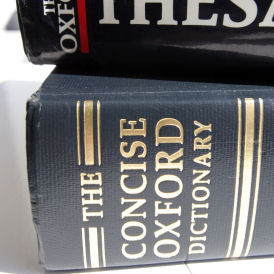Woot! Concise Oxford English Dictionary hits 100
As the Concise Oxford English Dictionary celebrates its centenary, Channel 4 News speaks to the editor about how words such as mankini, woot, and jeggings make it onto its pages.

It’s one of the best known reference books in the English-speaking world. Smaller and more contemporary than the great historical tome that is the Oxford English Dictionary, the Concise Oxford English Dictionary first appeared on bookshelves in 1911 and remains a bestseller.
The latest edition, the 12th, is published today. It contains 240,000 words, phrases and definitions, including 400 totally new entries.
Words and phrases such as alternative vote, domestic goddess, jeggings, mankini and upcycle all made the grade for the latest edition.
There’s no official panel of cabinet ministers. Dictionary editor Angus Stevenson on how new words are approved
Editor Angus Stevenson told Channel 4 News: “In 1911, the hot new word was ‘biplane’, for its time. A lot has changed but we are still keen to cover new language.”
He says adding new words to the dictionary is not just a case of finding an interesting word in a newspaper article and putting it in – although there is an element of that.
“We have a database of 2bn words which has whole texts, whole websites. So we key the word into that and see how common it is. It’s how the dictionary has always worked – we get as much evidence as we can so we know it’s not just a small number of people using the word and it’s not going to disappear.”
Words are approved and written by a small team, said Mr Stevenson, who is head of dictionary projects at the Oxford University Press’s academic division.
“There’s no official panel of cabinet ministers for new words or anything like that,” he added.
The Concise Oxford English Dictionary now (2011)
alternative vote: an electoral system whereby voters rank candidates in order of preference, candidates being eliminated and votes redistributed until one candidate achieves the required majority.
domestic goddess: (informal) a woman with exceptional domestic skills, especially cookery.
mankini: (pl. mankinis) a brief one-piece bathing garment for men, with a T-back.
retweet: (on the social networking service Twitter) repost or forward (a message posted by another user).
sexting: (informal) the sending of sexually explicit photographs or messages via mobile phone.
woot: (especially in electronic communication) used to express elation, enthusiasm, or triumph.
Words are also lost, and their meanings change, as the first edition of the dictionary itself shows. In 1911, a jet was a stream of water, a slogan was a Highland war-cry, and holocaust primarily meant “a wholesale sacrifice”.
The first edition of the dictionary had no entries for television or cinema, although it did have cockyolly bird (a nursery phrase for a bird) and impaludism (morbid state…found in dwellers in marshes). Other definitions seem very outdated – including cancan (indecent dance) and neon (a lately discovered atmospheric gas).

Oxford University Press said the dictionaries also show how language has changed through the last century – and the social, cultural and technical influences that led to these changes.
Mr Stevenson told Channel 4 News the internet and social media have had a huge impact on language, not only in creating new words but in circulating neologisms more quickly.
“For example, woot – I don’t use it personally, but that’s not relevant. It’s someone saying hurrah on Facebook, then their friends see it, and it spreads,” he explained. He said new words often reflect the era in which they enter the dictionary.
“We have added surveil – to keep a person or place under surveillance. Our society is certainly more observed and monitored, people do feel that, so this is a typical word of this time,” he said.
There are other examples of this from the past – Gestapo and anschluss were added in the 1944 edition. But some cultural phenomena are just not big enough for the Concise Oxford English, it would seem. Beatlemania was “sternly refused” for the 1964 edition.
The Concise Oxford English Dictionary then (1911)
brabble: paltry noisy quarrel
foozle: (slang) do clumsily, bungle, make a mess of
growlery: growling; place to growl in, private room, den
marconigram: message sent by Marconi’s system of wireless telegraphy
kheda: enclosure used in Bengal &c. to catch elephants
-
Latest news
-
‘It was hard not to laugh on set’ – Swede Caroline lead on root vegetable mockumentary5m

-
Teachers to be allowed guns in Tennessee schools5m

-
Tory MP defects to Labour over NHS ‘chaos’2m

-
Al Sharpton on US campus wars and the US election race between ‘two old white men’5m

-
Israel-Gaza war continues to fuel protests and division in US, France and UK4m

-




